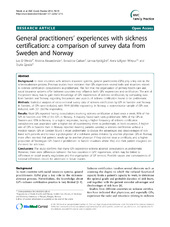| dc.description.abstract | Background: In most countries with sickness insurance systems, general practitioners (GPs) play a key role in the sickness-absence process. Previous studies have indicated that GPs experience several tasks and situations related to sickness certification consultations as problematic. The fact that the organization of primary health care and social insurance systems differ between countries may influence both GPs’ experiences and certification. The aim of the present study was to gain more knowledge of GPs’ experiences of sickness certification, by comparing data from Sweden and Norway, regarding frequencies and aspects of sickness certification found to be problematic. Methods: Statistical analyses of cross-sectional survey data of sickness certification by GPs in Sweden and Norway. In Sweden, all GPs were included, with 3949 (60.6%) responding. In Norway, a representative sample of GPs was included, with 221 (66.5%) responding. Results: Most GPs reported having consultations involving sickness certification at least once a week; 95% of the GPs in Sweden and 99% of the GPs in Norway. A majority found such tasks problematic; 60% of the GPs in Sweden and 53% in Norway. In a logistic regression, having a higher frequency of sickness certification consultations was associated with a higher risk of experiencing them as problematic, in both countries. A higher rate of GPs in Sweden than in Norway reported meeting patients wanting a sickness certification without a medical reason. GPs in Sweden found it more problematic to discuss the advantages and disadvantages of sick leave with patients and to issue a prolongation of a sick-leave period initiated by another physician. GPs in Norway more often worried that patients would go to another physician if they did not issue a certificate, and a higher proportion of Norwegian GPs found it problematic to handle situations where they and their patient disagreed on the need for sick leave. Conclusions: The study confirms that many GPs experience sickness absence consultations as problematic. However, there were differences between the two countries in GPs’ experiences, which may be linked to differences in social security regulations and the organization of GP services. Possible causes and consequences of national differences should be addressed in future studies. | en_US |

